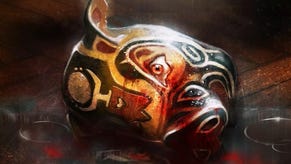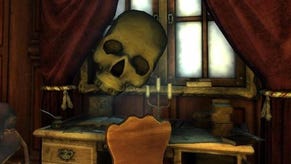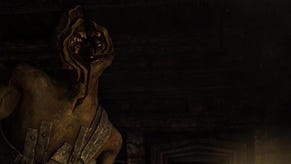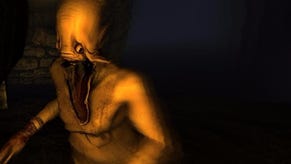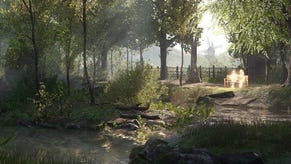Games of 2013: Amnesia: A Machine for Pigs
The pigs have won tonight.
Amnesia: A Machine for Pigs doesn't make a whole lot of sense and that's fine. I don't think it's meant to when even its creator admits that he has "two or three fairly contradictory interpretations of what might be going on at the end of Pigs at the same time". Pigs, as I'll call it for short, hangs its remarkable artistic achievements (Dan Pinchbeck's flowery, rotten prose; Jessica Curry's screeching, shrapnel bomb of a score; Sindre Grønvoll's's Grand Guignol labyrinthine environments) around the most threadbare of plots. Instead of focusing on a pat little tale, it creates an atmosphere of dread so potent that the conventional criteria of what we look for in a game - things like puzzles, plot, win/lose conditions - are thrown completely out the window in favour of an abstract, wondrous experience that hits notes other games simply don't. That it's so hard to grasp only adds to its charm.
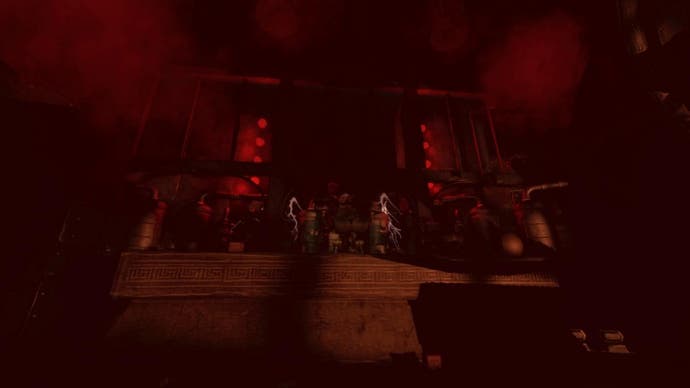
Where it seems most games these days are trying to emulate movies, Pigs is more like a poem or a song. The words, visuals, and sounds add flavour without providing a proper concrete narrative blueprint from which to navigate. It's a bit like the first time you listened to Kid A. It's never quite clear what Thom Yorke is yammering on about in Radiohead's seminal album, and most of the songs lack a chorus and are comprised of peculiar discordant sounds, but the overall ambiance is bewilderingly haunting while avoiding the usual melancholy dirges one typically pulls from to achieve the same effect. Pigs likewise deftly avoids the usual clichés with surprisingly little gore or on-screen violence, its action sequences are slim to nil, and the monsters are portrayed sympathetically as often as malevolent (though I'll confess that the spooky spectral children were a tad trite).
Yet it's still an outrageously disquieting game, because the most striking aspects of Pigs are the ones not shown but rather implied. While the ghostly streets of 1899 London are largely left vacant, we're able to understand protagonist Oswald Mandus' revulsion to society by his scrawls strewn about town. Normally the old adage is to "show, not tell", but it's hard to argue with developer The Chinese Room when Pinchbeck describes poor people fornicating as such:
"Men and women upon all fours, rutting carelessly, ejaculating their filthy little missives into the streets. Alleys and gutters running freely with the careless spill of their conjoinings. The air thick with the whimperings of lust. Bodies streaked with their own emissions. We have created a world where man is so utterly debased he will spray his seed over passers-by."
This is a profoundly inventive, almost comically "literary" way to describe shagging that sums up the character's worldview, provides a vivid image to the reader, and arguably still manages to be perversely erotic in its own putrid way.
Pinchbeck's penchant for snarling romanticised prose extends to all angles as protagonist Oswald Mandus' bleak cynicism encompasses all walks of life. He likens the poor to pigs, what with the careless spill of their conjoining and all, while the rich are pigs too, though they "wear their filth on the inside, but they are no less dirty." No one comes out unscathed from Mandus' slanderous mind, save for the children who he idealises as innocent and pure. He's Holden Caulfield of the Victiorian era - only with more pig monsters.
And what marvelous monsters they are! Rather than stick with the usual bout of shambling terrors we often get in Lovecraftian horror, we're treated with pig-men playing with children's building blocks; swine slopping up meat and wine in a misplaced banquet table awkwardly adorning a sewer; a woman snatched by an unseen creature the moment she opens her door. Never mind their snouts and guts, these portly porkers exhibit more pathos than every Resident Evil enemy combined. You may not be able to talk to the monsters, but you'll share a connection with them nonetheless.
In fact, you'll probably be more curious than fearful of these foes because they're kept at arms' length for the duration of the game. Pigs' most daring - and divisive - turn is in how little 'game' there is in this video game. It joins the shortlist of titles like Dear Esther (The Chinese Room's previous offering), Journey, and 30 Flights of Loving, where its primary mechanic is walking through linear environments while a story occurs around you. Puzzles and reflex-based challenges like stealth and chases are kept mercifully brief and you can't influence the story in any meaningful way.
It sounds like it shouldn't work, but it does; probably because it makes the game's limited interactions - which mostly consist of walking and light exploration - meaningful. Allow me to explain: a couple of years ago, a game came out called To the Moon that gained critical acclaim as players would shepherd their avatar through a series of barely interactive scenarios. The script was a compelling one, yet its only interactions were limited to rote, out-of-place puzzles, meandering walking, and tiresome clicking through slow scrolling text until the scene would advance. In short: its interactions didn't enhance the experience, but rather brought it to a screeching halt.
Pigs, on the other hand, is just as scripted as To the Moon, but the actual act of scouring the bowels of the multi-layered titular machine is in and of itself terrifically unsettling. Most locations are filled with terrifying noises of creaking wood, hissing steam valves, and the endless squealing of swine. Coupled with Curry's knowingly wrong opera permeating the soundtrack, it makes simple traversal convey emotions like fear, worry, pity and disgust better than any passive media like film could because you, the player, need to press forward and deal with the spooky sections yourself. There's no curling up on the couch and waiting for some blonde woman to get an axe in her back.
A Machine for Pigs isn't for everybody, and that's fine. Its performance-based challenges are few and far between, the linearity might turn off those expecting a wider path, and others won't get on with its oblique prose and ambiguous narrative. But those who meet it on its own terms as an abstract piece of flowery 1890s pulp aided by haunting music, dreary art direction, and unnerving environments will find it mercifully streamlined.
Where other games may provide a heartier meal with surplus to spare, Pigs is a lean cut of meat with barely a smidge of fat left over. It may not fill you up right away if you're in the mood to pig out, but it's rather like those fancy skewers high-end restaurants sell for a tenner: they'll leave you hungry, but you won't be able to forget them any time soon. Amnesia: A Machine for Pigs may not be the best game of 2013, but for my money it's certainly the most delicious.




